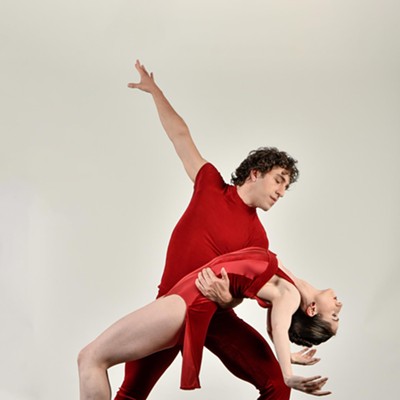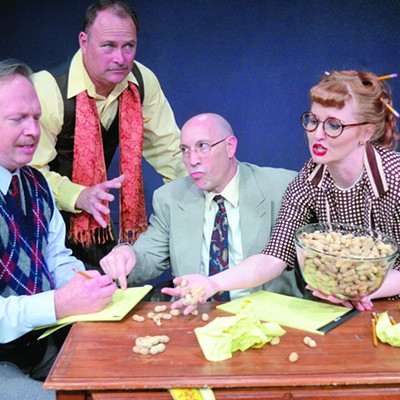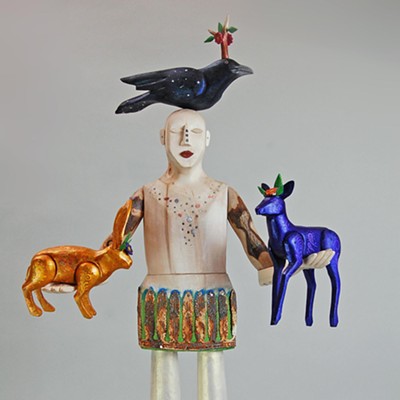The Lost Ones
The Longing: The Forgotten Jews of South America7 p.m., Monday, Jan. 14
Tucson Jewish Community Center
3800 E. River Road
299-3000, ext. 200; tucsonjewishfilmfestival.org
There are up to 18 million people in Latin America with some Jewish blood--descendents of crypto-Jews, the Spanish and Portuguese immigrants who secretly practiced Judaism during the Spanish Inquisition.
Today, remnants of Jewish heritage in Central and South America have been all but lost. With almost no Jewish communities to turn to--and rampant xenophobia to deal with--many South Americans of Jewish descent feel incapable of uncovering their hidden links to the ancient culture.
Gabriela Bohm, an Argentinean-born filmmaker who is Jewish herself, understands the situation as only an insider could. Her documentary The Longing: The Forgotten Jews of South America follows six Ecuadorians who long to bring their Jewish roots to the surface by converting to the religion. It's no easy undertaking, but eventually, they come across an American rabbi who tutors them through e-mail and eventually travels to Ecuador to officiate at their formal conversion rites of passage. Not to ruin the movie, but there's a happy ending.
The Tucson Jewish Community Center will feature The Longing as part of the annual Tucson Jewish Film Festival, and the good folks there have invited Bohm to give a post-screening talk and a question-and-answer session.
"It's just really interesting to see the combination of Latino and Jewish culture," says Susan Silverman, director of the festival. "Crypto-Jews are fascinating, and there are many people in Tucson who have Jewish traditions in their families but don't know anything in-depth about their heritage. ... Whether you're Jewish or not, this film is an easy way to connect to the Jewish experience--there's no obligation." Admission to the film and talk will be $8. Check out the festival Web site for information on other featured films. --A.M.
A Play on Letters
Vita and Virginia8 p.m., Saturday, Jan. 12; 3 p.m., Sunday, Jan. 13
Berger Performing Arts Center
1200 W. Speedway Blvd.
882-9721; invisibletheatre.com
From the early 1920s until her 1941 suicide, feminist author Virginia Woolf carried on an on-again, off-again affair with friend and fellow writer Vita Sackville-West. Soon after they met, Woolf was infatuated, writing of her lover: "She shines with a candle lit radiance, pink glowing, grape clustered, pearl hung."
In many ways, the two women were direct opposites. While Woolf was a repressed, depressed, middle-class intellectual with no other female lovers, Sackville-West was an outgoing aristocrat who engaged in numerous lesbian liaisons. And while both women were published authors of the Bloomsbury set, Sackville-West's writing was actually more popular and commercially successful than Woolf's. These differences made for a somewhat rocky relationship.
Although both husbands knew of their relationship, Woolf and Sackville-West saw each other in person relatively rarely. Lucky for us, they were writers--thus, their entire association is chronicled in letters. An avid Woolf fan, British actress and playwright Eileen Atkins decided these letters would make for great theater. Her play Vita and Virginia somehow manages to be dramatic and enthralling despite being comprised almost entirely of written correspondence. And this weekend, the Invisible Theater is bringing Vita and Virginia to Tucson, starring Broadway stars Kathleen Chalfant and Patricia Elliott.
"This play is New York-based and award-winning," says Susan Claassen, the theatre's managing artistic director. "This is an exciting time for Tucson audiences--it will touch their hearts and inspire artistic imagination. ... With this play, we find (Woolf and Sackville-West's) inner life coming to life."
Admission to the play is $42 per person, with discounts offered for groups. Any tickets remaining a half-hour before each performance will go for half price. --A.M.
The Ethics of Eating
"Eating Between the Lines: Where Our Food Comes from and Where It's Going"6 to 8 p.m., Thursday, Jan. 17
Trinity Presbyterian Church
400 E. University Blvd.
622-0525, ext. 251
Food is a human right, and while the world's growers produce more than enough calories to go around, people in many countries still die of starvation.
That's why eating is a moral act, says Brother David Andrews, of the National Catholic Rural Life Conference, a Catholic group promoting better agricultural, environmental and trade practices in rural communities. Andrews believes that we all have a right not just to choose what we eat, but to choose the system we want to feed us. Do we want an industrial agricultural system based solely on making money, or a sustainable, ecological system focused on the health of every individual? (Hint: We probably want the latter.)
Next Thursday, Jan. 17, at an event hosted by the Community Food Bank, you can hear Andrews speak. He'll talk about the food system that's dominant in our world today, as well as alternatives that focus on "food security": the assurance that all people at all times have access to nutritious, safe and culturally appropriate food produced in an ecological and socially just way.
"There are ways our food system is working," says the Community Food Bank's Kitty Ufford-Chase. "There's an abundance of food, and for the most part, we spend very little on food. However, our food system is not working in that the food that's good for us is the most expensive, and there are many people who aren't getting enough food in this country--the richest country on Earth. Also, the way our system is set up has devastating environmental impacts. Many of the ways our food system works are unjust, and we need to be thinking about what kind of changes need to happen." The event includes a delicious--and moral--dinner. Admission is just $6.50 per person, and vegetarian dinner options are available. --A.M.
Creative Connections
Glassman Foundation Family Arts Festival11 a.m. to 5 p.m., Sunday, Jan. 13
From El Presidio Park to the Tucson Convention Center, Downtown
624-0595; familyartsfestival.org
Viewing art is wonderful, but living art is better. That's the idea the Tucson Pima Arts Council has been successfully perpetuating through their Family Arts Festival.
This year's festival will feature most every kind of art one can imagine: music for every taste, dances of almost every style, and unique entertainment from cowboy poets to martial-arts demonstrations. And it'll all kick off at El Presidio Park with a huge parade led by Brazilian percussionists Batucaxé and a spectacular aerial balloon drop by pyrotechnic troupe Flam Chen.
One of the festival's main attractions will be the Experience Project, a series of workshops that allow artists and audiences to connect as they create together. In one workshop, folks from the Mat Bevel Institute will lead participants in making kinetic sculptures and wearable art. In the Sound Tent, a barbershop quartet will sing with the audience; a representative of the UA Poetry Center will lead people in sonnet creation; and the Dambe Project will make percussion music so catchy that everyone will feel the need to participate. The whole time, KXCI FM 91.3 will be right there, recording it all.
"The Experience Project came about from wanting people to have more interaction with artists," says festival committee member Donna Kreutz. "It brings artists and audiences together, and you actually become the art."
Other festival features include mural making by renowned artist David Tineo, an "Art Meets Science" presentation with a NASA space artist, a photo booth that will post images online, and the R.U.M.B.A. art contest, in which everything is created from recycled materials. All these activities are free.
"Everyone should come to experience the wonderful arts community that is Tucson--all in one place," says festival director Mia Hanson." --A.M.







